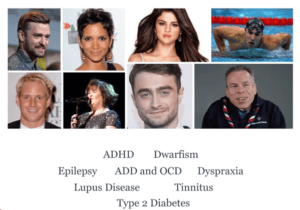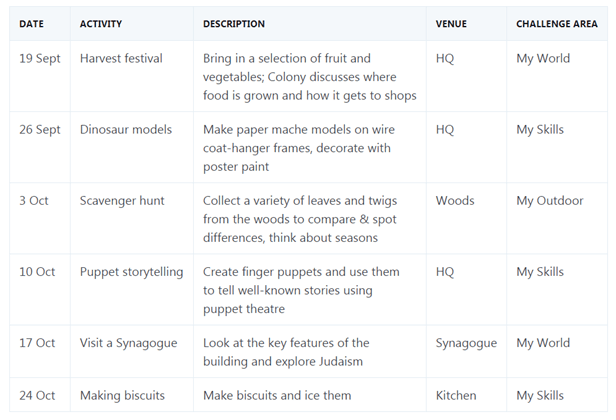Introduction
Read each of the sections below and complete all the activities. Once you reach the end, you can upload evidence of your work from the activities for the ESLYL to evaluate and keep track of your progress so you must complete it to have evidence of this module. You can either write your work digitally or take a picture of any pieces of paper you use. However you choose, make sure you keep track of your work to get the recognition.
Objectives
This module will teach you how to create an environment that is inclusive and welcoming for all young people in the section. It will give you an understanding of some different additional needs a young person might have, and show you how to make reasonable adjustments to make the programme more inclusive for all.
By the end of the module, you will have an understanding of:
- that every young person is different
- that every young person is welcome in Scouting
- your role in contributing to a positive and inclusive environment
- a range of additional needs may affect participation in the programme
- how to adapt programmes to meet the needs of all young people within the section
- where to get further information and guidance
Encouraging diversity in Scouting promotes respect for different ideas and perspectives as well as an understanding of differences that can impact on others.
When we talk about inclusion in Scouting, we are talking about the act of ensuring that Scouting is open to all and supporting anyone to overcome any barrier to participating in the Scouting programme. As part of being inclusive, we need to ensure that our programme and meeting place is appropriate and that we have considered any additional needs members might have.
It is important to consider diversity and inclusion as at its core Scouting is an inclusive, values-based movement and membership is open to all those who share our fundamental values. A person’s differences and uniqueness should be encouraged and celebrated.
Activity 1
Write down what inclusion and diversity mean to you, and why they are important in Scouting. Do you think your section/group is fully inclusive?
To run activities in your section that will help to explore the themes of diversity and inclusion, have a look at the following badges for your section level:
Beavers: Faith, International, My World, Community Impact
Cubs: My Faith, International, World Faiths, Our World, Community Impact
Scouts: My Faith, International, World Faiths, World, Community Impact
Additional Needs and Disabilities
Additional needs and disabilities may be visible or invisible, and the needs of each young person will be unique. Some may occur for a limited period of time. For example, a broken arm, an illness, or some emotional needs due to a family break-up, are all temporary needs.
However, many additional needs are permanent conditions. These include conditions such as asthma, ASD (Autism Spectrum Disorder), dyslexia or physical disabilities.
Some additional needs can fluctuate and may be affected by a range of different factors, such as stress. Additional needs and disabilities should not prevent a young person from being able to participate in Scouting. By making reasonable adjustments (doing things differently or providing additional support), most young people can access Scouting and develop to their full potential.
It is also important to be aware of any allergies, medical needs, faith or cultural needs a young person may have. For example, you may need to cater for vegetarian, Halal and Kosher diets or a young person who is coeliac or has a nut allergy and ensure that their needs are incorporated into section meetings and camps.
https://www.youtube-nocookie.com/embed/ure8Lrbh5HY
Activity 2
Match the celebrity with their additional need:

All these celebrities have some form of additional needs, but they have not prevented them from excelling in their respective fields. Just because someone has some form of additional needs, it should not stop them from joining in and pursuing things that they are interested in.
To run activities in your section that will help to explore the themes of Disabilities have a look at the following badges:
Beavers: Disability Awareness, Community Impact
Cubs: Disability Awareness, Community Impact
Scouts: World, Community Impact
Additional Needs and Inclusion
Additional needs and disabilities should not prevent a young person from being able to participate in Scouting. By making reasonable adjustments most young people can access Scouting and develop to their full potential. Most adjustments take the form of adding something to or removing something from the activity. Adjustments could include:
- Altering a game’s rules to make it no contact
- Providing one to one support
- Having one young person read the instructions for another
- Having different food options available
Activity 3
Have a look at the following term programme and decide what, if any, adjustments may be needed to overcome the situations below. If you are viewing this on mobile you may need to scroll sideways to see the full table.

Scenarios:
- You have a young person who is on the autism spectrum and will need additional support to understand and follow instructions.
- You are planning your camp and a young person who is Jewish and follows a kosher diet will be coming along. The young person will also need time and space to pray during the event.
- You have a young person who wears a headscarf in your group. Are there are considerations you need to make to ensure everything is inclusive in the Programme?
- You have three young people with glasses in your group.
You have one young person who can’t eat wheat and one young person who has asthma
Further information
There are some very useful resources to help ensure a Scouting programme is inclusive for all. These include:
- Deaf Friendly Scouting resource
- A Million Hand’s resources: Mind, Leonard Cheshire, Guide Dogs
- Refugee resources
- Makaton promise
- Alternative versions of the promise
These can all be found on scouts.org.uk
If you ever have any questions about specific situations relating to additional needs and inclusion then don’t be afraid to discuss it with an adult leader. Not knowing how to deal with certain circumstances at first is okay if you are open minded and willing to learn.
Conclusion
Look back at the objectives at the top of this page and see if you think you are confident with each of them. If there are any parts you are unsure of then you can contact the YL training team with any questions.
When you have completed the activities above send upload your evidence to [email protected] , ensure you label it clearly with your Name and the Module. We will review and confirm receipt, updating your records and progress within the scheme.
You need to complete this to be signed off.












